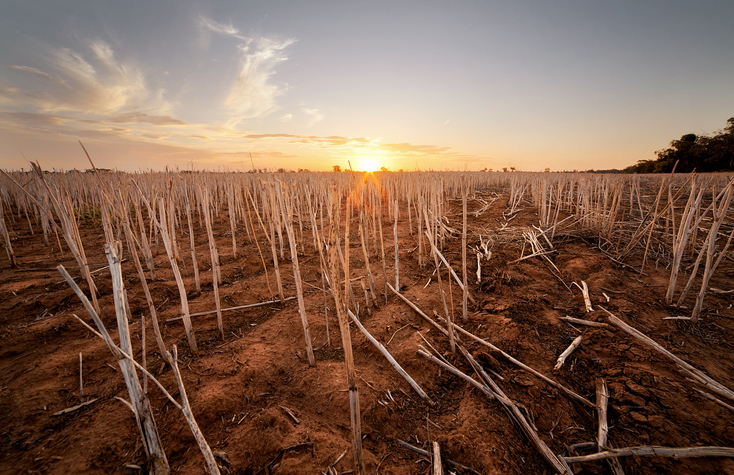Aussie Agriculture Hacks Farms To Beat the Climate Crisis
- By Lachlan Colquhoun
- January 20, 2024

Australia may be one of the world’s most drought-prone countries, but its agtech and climate science initiatives have the potential to make it more resilient. It is also seeing new startup companies creating technologies that can be globally scaled.
One initiative driving this is Australia’s first-ever drought resilience commercialization initiative, the Drought Venture Studio, which aims to develop resilience products and services while delivering commercial returns.
Beanstalk AgTech is both an agtech consultancy and venture capital firm and has received a Federal Government grant to nurture a new generation of startups.
Beanstalk’s Drought Venture Studio will work closely with Australian producers and agribusinesses to ensure a focus on the most pressing challenges while playing a hands-on role in connecting farmers with innovators and early-stage agrifood startup investors.
Cal Archibald, director at Beanstalk AgTech, says Australia can lead the world in drought resilience innovation.
“Australia is the driest inhabited continent on earth, yet we have a vibrant agricultural sector that has constantly adapted to climate change challenges over time,” says Archibald.
“Necessity has made us amazing innovators. We want to capitalize on this knowledge and expertise to deliver real-world outcomes for our farmers and commercial returns for those along the agri-innovation value chain.”
The Drought Venture Studio will take eight startups to market and provide hands-on commercialization support for nearly 100 other innovators.
“We want to build businesses that deliver solutions for Australian farmers, have the potential to be scaled globally and deliver long-term returns for investors,” Archibald says.
Drought Venture Studio has the potential to unlock solutions for some of the most pressing and destructive agricultural challenges.
“Imagine if we could perfectly predict the micro-climate of each paddock or utilize winter rain in the summer months or even increase our soil water holding capacity tenfold,” Archibald adds.
Climate disruption
Much has been made in recent years of the potential for Australia’s agtech industry, which is seen as vital if the agriculture industry is to meet ambitious production targets during climate disruption.
In 2019, Australia’s peak farming body, the National Farmers’ Federation (NFF), set a target to grow the value of Australian agriculture from AUD60 billion to AUD100 billion by 2030. Still, the growth rate is faltering, and there is a risk that the target won’t be met.
Agtech solutions present a critical element in driving both resilience and productivity. In 2021, the Federal Government set aside AUD86 million to establish eight adoption and innovation hubs across regional Australia as part of a Digital Foundations for Agriculture Strategy.”
Agtech is also being pushed on a state level, such as in Victoria—home to a quarter of Australia’s farm businesses.
“We see this as a huge opportunity to actually convert some of Australia’s often heartbreaking experience of drought and convert that into scalable products which can be used in the Asia Pacific.”
State Government agency Invest Victoria claims that Victoria is seeing a 20% year-on-year growth in smart farming devices and that the state’s agtech sector will be worth AUD100 billion by 2030.
It name-checks several innovative agtech companies across all cycles of growing and delivery, such as Fieldin, Gallagher, Netafilm, Finistere and an arm of the German industrial giant Bosch which has located a hydrogen business in Victoria.
Scouring solutions
Beanstalk will work with eight startups and look for solutions from adjacent industries in its drought resilience initiative.
“The solutions we find for our clients don’t necessarily come from agriculture,” says Archibald.
“Often, we find them in mining and logistics technology and those sorts of things, so we’ll be looking at adjacent sectors and seeing if we can license those capabilities into agriculture.”
Archibald says he and his colleague will do due diligence on around 96 different startups in the next two years and then do a “deep dive” on the final eight.
AI will be a crucial area for the search, with a potential focus on weather prediction technology, which is becoming more powerful and sophisticated.
“Some of the new models we are seeing are really using AI to deliver much more localized predictions, so that will be of much more use to farmers,” says Archibald.
“Moisture retention and some of the more biotech opportunities are going to be of great interest, and we’re also expecting that there might be some more advanced and tech-driven insurance products that are going to come through to help with resilience.”
Archibald agrees that success will mean the startups will benefit farmers and commercial in their own right.
“We see this as a huge opportunity to actually convert some of Australia’s often heartbreaking experience of drought and convert that into scalable products which can be used in the Asia Pacific and the result of the world,” he says.
Image credit: iStockphoto/jandrielombard










Lachlan Colquhoun
Lachlan Colquhoun is the Australia and New Zealand correspondent for CDOTrends and the NextGenConnectivity editor. He remains fascinated with how businesses reinvent themselves through digital technology to solve existing issues and change their business models.